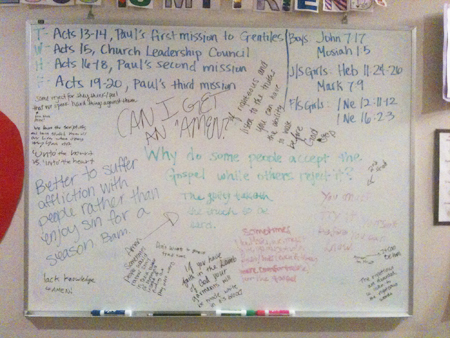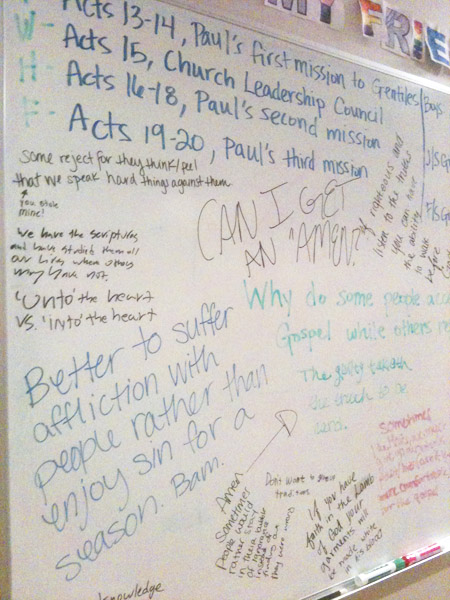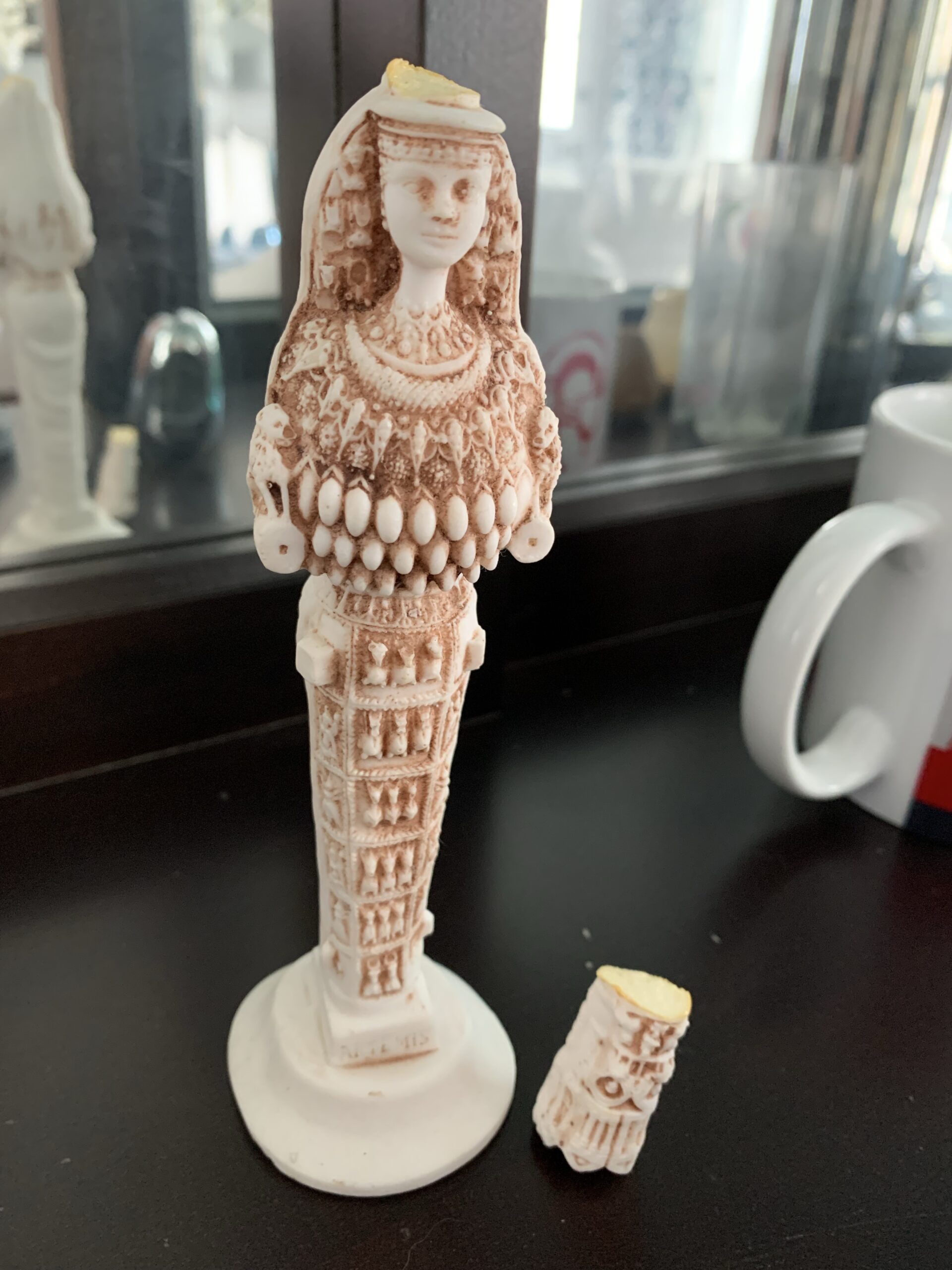Monday of this week was a free day. I planned to celebrate birthdays with a party and watch movies, but my class president didn’t organize the food, so we ended up just watching Bible Video movies. Not great. I don’t like wasting time like that.
Acts 13-14 – Paul’s First Mission
My lesson objective this day was to talk about why some people accept the gospel while others do not, with an emphasis on personal readiness. A minor objective was for kids to understand why people can not be justified by obedience to the law.
In preparation for this activity I wrote on the board: “Why do some people accept the gospel while others don’t?” I had the missionaries over, too, because they had been at our house for dinner Monday evening and I invited them to come for their weekly challenge when we’d be talking about missionary work. Also on the board I wrote:
- Boys – John 7:17, Mosiah 1:5
- Junior/Senior Girls – Hebrews 11:24–26, Mark 7:9
- Freshmen/Sophomore Girls – 1 Nephi 2:11–12, 1 Nephi 16:2–3
After about 20 minutes of lesson and introduction to the topic that started by reading Acts 14:21–22, I said that one of the great tribulations a missionary or disciple of Christ experiences is when people reject the gospel message. Certainly Paul experienced it, and he was a powerful missionary. Why, then, do some people accept the gospel while others reject it? Using the above scriptures, we did an activity I read about on Pinterest called Chalk Talk by Erin Guinup. Basically, your discussion takes place on the board instead of aloud. This worked surprisingly well! I was really pleased. All of the kids were given dry erase markers, and after they read their scripture, they wrote on the board what they learned. They could comment on another person’s writing or write their own. Slower readers got to make some of the better comments as they read the other’s words.


Acts 15 – The Circumcision Decision
Do you like my title for Acts 15? Church manuals always call this the Jerusalem Council, but Circumcision Decision sounds better. Or at least more memorable, anyway.
This day I didn’t have a great activity either, but I did want to impress upon the students how decisions are made in the church. We have this idea that the prophet/bishop/stake president/whatever has a miraculous vision telling everyone what to do, and we all do it. That does happen, but more frequently, policy decisions and changes are made when a problem comes to the attention of leaders and they seek in council to fix the problem. I wanted the kids to learn that choices are made by the quorum of the twelve and first presidency and seventies unanimously. I asked them to think about the recent decision regarding mission ages and what this rule of unanimity indicates about how that decision was made. Even I can think of a lot of cultural and logistical problems with having younger missionaries serving, and I can see benefits. Those leaders would have seen more based on their experience, and yet they were able to come to a unanimous decision. I didn’t have a good way to teach this, so I used some quotes from the manual and other sources on Common Consent and Unanimity. My handouts aren’t great, so I’ll just post the content of the handouts here:
Common Consentv
The presiding quorums and councils of the Church are different in their deliberation from other groups or bodies who conduct their business after the manner of the world. This difference has been stated as follows:
“… In Church Councils every decision must be unanimous. In the world, ‘the majority rules,’ and the minority is set aside. It is possible to obtain unanimity in the Church Councils, because there is no one there who has any selfish interests to ‘fight for.’ In those assemblies everything is done, when the Spirit of the Lord prevails, ‘in all righteousness, in holiness, and lowliness of heart, meekness and long suffering, and in faith and virtue, and knowledge, temperance, patience, godliness, brotherly kindness, and charity.’ When each member endeavors to conform his views on every question that comes up for consideration, to these requirements, and eliminates all personal preferences, unity can be maintained. In these Councils each member freely states his views, but when the opinion of the majority is ascertained, this is always found to be based on truth, and the minority gladly falls in line. For it is of such Councils that it can be said absolute truth, vox populi, vox Dei.” (Doctrine and Covenants Commentary, Deseret Book Company, 1951, p. 701.)
The Saints can have faith in their leaders and vote unanimously on all propositions, knowing that the things presented for their sustaining vote were approved of the Lord to their leaders before being presented to the membership of the Church.
President Stephen L. Richards stated that we have unanimity of thought and action in the Church because it is based on righteous principles. These are his words:
“There are some, perhaps, who may feel that it is subversive of individual freedom of thought and expression to be controlled by the interpretations of our leaders. I wish to assure them that any feeling of constraint will disappear when once they secure the genius and true spirit of this work. Our unanimity of thought and action does not arise, as some suppose, from duress or compulsion in any form. Our accord comes from universal agreement with righteous principles and common response to the operation of the Spirit of our Father. It is actuated by no fear except one. That is the fear of offending God, the Author of our work.” (Conference Report, October 1938, p. 116.)
… “I want to say to the young men and the young ladies and to all the people—but especially our children, the youth in Israel—that the leaders of this people do not speak of themselves. That which they are striving to impress upon the people is of the Lord and not of man. The Latter-day Saints have not been gathered from the different nations of the earth, and brought together in these mountains to worship man, nor to serve man, to be their slaves, nor to be obedient unto man, and if anybody has such an idea or intention they have got hold of the wrong people. The people who are gathered here are not the people calculated to do such a thing. The faith we teach throws everybody upon their own responsibility; they are at liberty to act and choose for themselves, and all will be held responsible before God for their faith and conduct.” (JD, vol. 24, p. 158.)
When the responsibility for knowing that a matter is right is shifted to the individual, it places him in a position where he must justify his acceptance or rejection. He will be held accountable for the decision he makes—if he misjudges the matter, he will have to suffer the consequences because he has placed himself in opposition to those who have been called to positions of responsibility in the Lord’s church.
Voting in the Church is a personal matter for each individual member. Since each one may know the truth for himself, his obedience must be entirely voluntary. There can never be any element of force or coercion in The Church of Jesus Christ of Latter-day Saints. It is a fact that each member may vote his own conviction and yet see all in one accord. Mormons should not follow their leaders blindly. They should follow them intelligently because the leaders give the word of the Lord to their members and the Lord will reveal to each member, individually, a knowledge of that fact.
From Alma P. Burton, “‘All in Favor, Please Signify!’,” Ensign, Mar 1974, 14
Unanimity
To teach how unanimity is achieved in the governing councils of the Church, President Boyd K. Packer of the Quorum of the Twelve Apostles explained: “I can best tell you how you are governed today … by explaining the principles and procedures we follow in the meetings of the First Presidency and Quorum of the Twelve Apostles. These procedures protect the work from the individual weaknesses apparent in all of us.
“When a matter comes before the First Presidency and the Quorum of the Twelve Apostles in a temple meeting, one thing that is determined very quickly is whether it is of serious consequence or not. One or another of us will see in an apparently innocent proposal issues of great and lasting consequence. …
“It would be unthinkable to deliberately present an issue in such a way that approval depended upon how it was maneuvered through channels, who was presenting it, or who was present or absent when it was presented.
“Often one or more of us is away during regular meetings. We all know that the work must proceed and will accept the judgment of our brethren. However, if a matter has been studied by one of the Quorum in more detail than by the others or he is more familiar with it either by assignment, experience, or personal interest, the matter is very often delayed until he can be in on the discussion.
“And, always, if one of us cannot understand an issue or feels unsettled about it, it is held over for future discussion.
“I remember occasions when a delegation was sent to the hospital to discuss with a member of the Council who was ill some urgent matter that could not be delayed but which needed that ‘unanimous consent.’ There are occasions, as well, when one of us will leave the meeting temporarily to call one of our number who is abroad to get his feelings on a matter under discussion.
“There is a rule we follow: A matter is not settled until there is a minute entry to evidence that all of the Brethren in council assembled (not just one of us, not just a committee) have come to a unity of feeling. Approval of a matter in principle is not considered authority to act until a minute entry records the action taken—usually when the minutes are approved in the next meeting.
“Sometimes an afterthought keeps one of us restless over a decision. That is never dismissed lightly. It cannot be assumed that that restless spirit is not in fact the Spirit of Revelation.
“That is how we function—in council assembled. That provides safety for the Church and a high comfort level for each of us who is personally accountable. Under the plan, men of ordinary capacity may be guided through counsel and inspiration to accomplish extraordinary things” (“I Say unto You, Be One,” Brigham Young University 1990–91 Devotional and Fireside Speeches 1991, 83–84; emphasis added).President James E. Faust (1920–2007) of the First Presidency explained why unanimity is so important: “This requirement of unanimity provides a check on bias and personal idiosyncrasies. It ensures that God rules through the Spirit, not man through majority or compromise. It ensures that the best wisdom and experience is focused on an issue before the deep, unassailable impressions of revealed direction are received. It guards against the foibles of man” (in Conference Report, Oct. 1989, 11; or Ensign, Nov. 1989, 10; emphasis added).
The men who serve in the Quorum of the Twelve are men of strong opinions and differing backgrounds. Nonetheless, President Gordon B. Hinckley noted an absence of discord or feelings of enmity between the brethren:
“I add by way of personal testimony that during the twenty years I served as a member of the Council of the Twelve and during the nearly thirteen years that I have served in the First Presidency, there has never been a major action taken where this procedure was not observed. I have seen differences of opinion presented in these deliberations. Out of this very process of men speaking their minds has come a sifting and winnowing of ideas and concepts. But I have never observed serious discord or personal enmity among my Brethren. I have, rather, observed a beautiful and remarkable thing—the coming together, under the directing influence of the Holy Spirit and under the power of revelation, of divergent views until there is total harmony and full agreement. Only then is implementation made. That, I testify, represents the spirit of revelation manifested again and again in directing this the Lord’s work” (in Conference Report, Apr. 1994, 74–75; or Ensign, May 1994, 54, 59; emphasis added).
Teachings of the Living Prophets Student Manual, (2010), 56–69
Acts 16-18 – Paul’s Second Mission
I promise my seminary students at the beginning of the year that I will never give them an assignment that takes more than 20 minutes. I explain that they will EASILY finish all assignments in less than 20 minutes just four or five times a week (this was true in Old Testament, too, and we even read extra stuff). Most kids are skeptical at first. It takes them about a month to realize that it’s for real; most daily reading assignments are in the 5-10 minute range. I tell them if they ever are intimidated by the amount of reading, they can set a timer for 20 minutes and read until it goes off. If it goes off in the middle of a reading they can stop.
On this day I asked the students if they had any trouble finishing this entire assignment in less than 20 minutes. No one did, not even those that read aloud with their parents.
I used the lesson manual and wrote on the board “You can’t preach the gospel without _____.” This started a pretty good discussion for a lesson opener. My lesson wasn’t terribly clever, but I used the entertainment-seeking of the Athenians to guide a discussion to how can entertainment-seeking today keep us from hearing the Holy Ghost today, touching briefly on video games. I thought that was a pretty good segue, so I’m posting it in case it helps other teachers.
This day was Valentine’s Day, so I gave each of the girls a rose and the boys a bottle of IBC root beer.
Acts 19-20
This day I focused in on object-worship, or the misunderstanding people can get that objects have inherent power, rather than ascribing miracles to their true source: faith. I showed the kids a little panda that my daughter used as a good luck charm to help her get 600s on her SOL tests. She blamed her good scores on the panda, not on her study throughout the year or the fact that pandas make her happy and could cause her to be less stressed during the exams. The panda itself has no inherent power, but in her case, it served a useful purpose. We talked about the Ephesians and their Diana worship, the hanky story in Acts, and then I backed up and used Paul’s speech on the Unknown God at Mars Hill in Athens to demonstrate the true nature of God, cross referencing to Genesis 1:26–27.
I visited the ruins at Ephesus some years ago, and I bought a little statue of the goddess Diana while I was there in memory of Paul’s kerfuffle with the Ephesians. There’s still a trade in idols there. Mine isn’t silver, though :) I used it as a visual aid along with the panda.
image here

We wrapped up by reading Paul’s testimony at the end of Acts 20 aloud with a little commentary. What a fantastic sermon. I hope when my life is through I can say I, too, did my very best to serve the Lord and reach out to others. Can’t say I’m there yet….
As an aside, our devotional was very good today. The student told a story her grandma told her when she got baptized. Her grandma told her that in life, we are like children caught in a thunderstorm. Sometimes the power will go off. And the flashlight is on the other side of the room, of course. Occassionally there are strikes of lightning that help us make our way to the flashlight. Those flashes are the Holy Ghost. Once we make it across the room, we can get the flashlight and have the light and guidance of the Holy Ghost with us all the time.
It was pretty great analogy, though I’m not doing it justice. She told it in a way that kids were actually commenting about the story afterward. That, to me, is the very best thing that can happen in Seminary, students becoming confident enough to share knowledge or testimony and others being touched and commenting on it. I’m glad I got to see it today.
——————-
This week has seemed to fly past. I have almost finished painting the master suite, and it looks great! Even Jared thinks so, even after not being very excited about the paint colors I chose at first. I hope to finish painting the main areas in the bathroom tomorrow.
DS brought home some illness from Model UN last week (apparently most of the kids came down with it, probably from being cooped up together for so long on the bus) and now Jared has caught it, too, and has been ill the past few days. DD and I seem to be doing pretty well, however. I have kept on helping out at her school, though yesterday I was pretty irritated when the teacher asked me to come to school to do 20 minutes worth of photocopying. It took me longer to drive there than to run the copies.
The developer has been putting in the second phase of the new subdivision across the road. I am not loving it so far. While I’m glad they’re finally clearing up all that undergrowth they allowed to come up over the past several years, the trucks are noisy and beep constantly while making the roads. It’s been better today and yesterday, so maybe they’re finished with that bit for a while. The good news is that we might be getting cable in pretty soon. What a blessing it will be to have wired internet! We have three forms of wireless in this house: Sprint (unlimited, but 3G), Wild Blue (fast, but ridiculously low bandwidth limits), and AT&T (unlimited only on my phone). We are super heavy users, but 3 kinds of internet, two UNLIMITED, should not be necessary. One of them is on the fritz pretty much all the time. It really makes me crazy. It’s the price of living in the country, I suppose, but we are 45 miles from the White House in one of the top 10 wealthies counties in the entire United States for pity’s sake. We ought to be in the very heart of internet connectivity.
I have missed church the past two Sundays, and both times I missed things I wish I could have seen. My seminary students were the speakers (they are always careful to point out when I don’t hear them speak — I hope that means they are trying to do a really good job, seeing as we have been practicing speaking so much), and I also missed the Come Follow Me teacher training they had the second hour last Sunday. Our ward is doing two trainings per month. One is for SS teachers and is held at night during mutual, and the other is the second hour on the second Sunday for YM/W teachers. They asked me to come, and I’ve been excited to go. I’m sorry I missed it. I missed the one on Tuesday because it was the open house for the high school. GG. That place is HUGE!
It’s hard to watch these babies grow up sometimes. Okay, all the time. I hope they make wise choices as they are faced with more of them.


